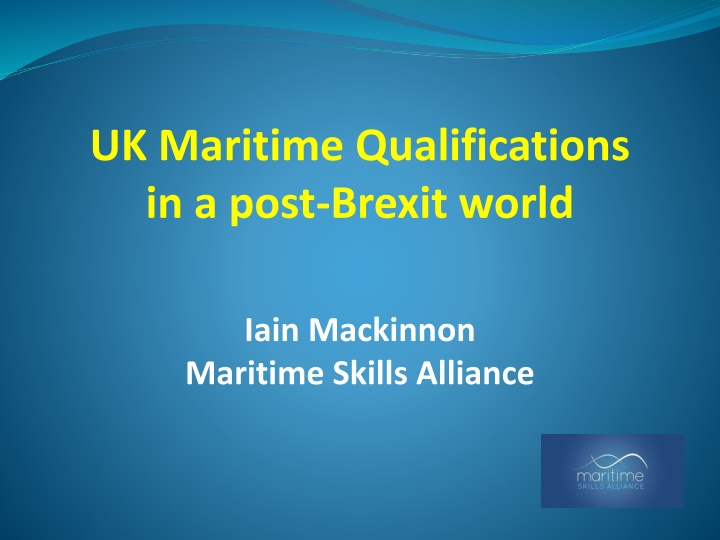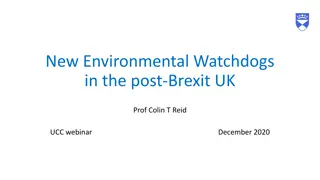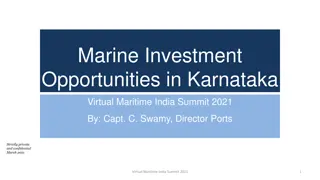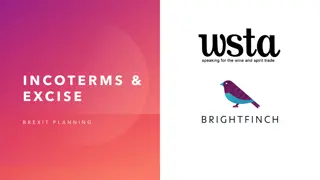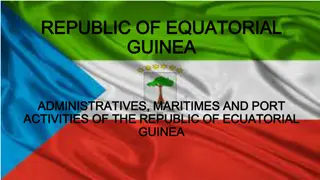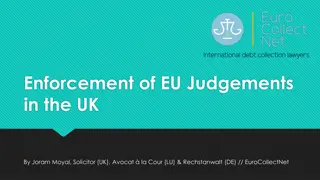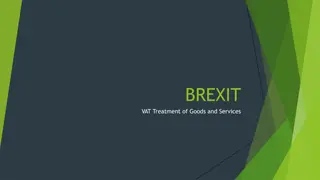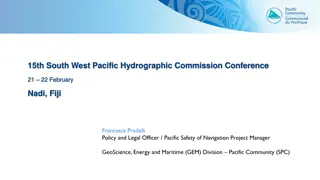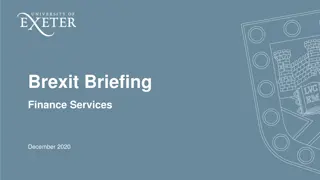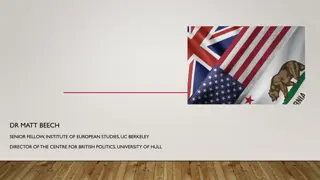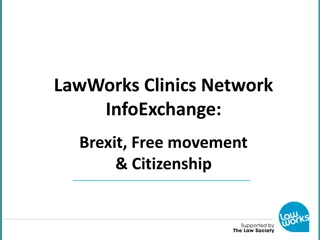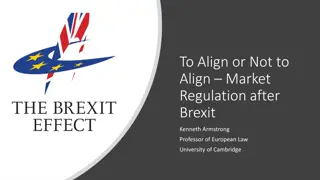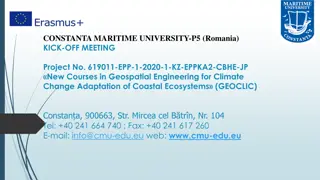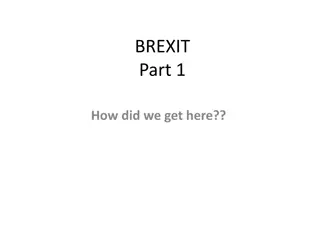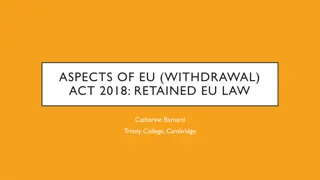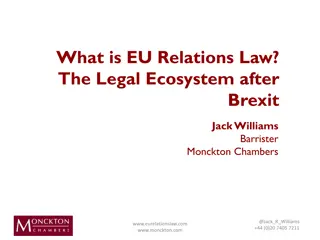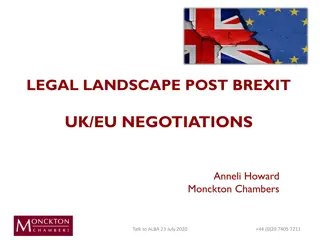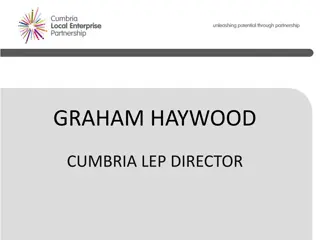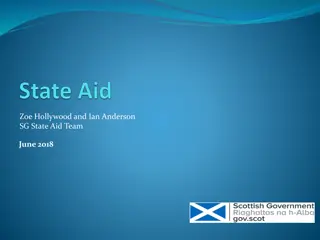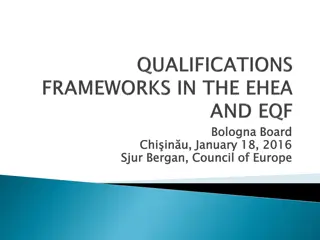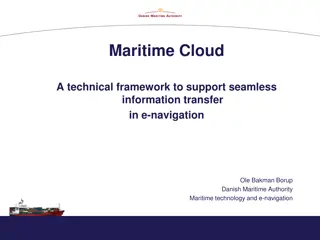UK Maritime Qualifications in a post-Brexit world
Recognition of professional qualifications for regulated and non-regulated professions in the UK post-Brexit, implications for seafarers, application process, and implications on EU recognition.
Download Presentation

Please find below an Image/Link to download the presentation.
The content on the website is provided AS IS for your information and personal use only. It may not be sold, licensed, or shared on other websites without obtaining consent from the author.If you encounter any issues during the download, it is possible that the publisher has removed the file from their server.
You are allowed to download the files provided on this website for personal or commercial use, subject to the condition that they are used lawfully. All files are the property of their respective owners.
The content on the website is provided AS IS for your information and personal use only. It may not be sold, licensed, or shared on other websites without obtaining consent from the author.
E N D
Presentation Transcript
UK Maritime Qualifications in a post-Brexit world Iain Mackinnon Maritime Skills Alliance
What Ill cover 1. Recognition of Professional Qualifications in the EU since 1st January 2021 Turing Scheme: international mobility 2. The Maritime Skills Commission
Recognition of Professional Qualifications 1 Regulated professions 2 Seafarers STCW 3 Non-regulated professions (eg RYA)
1 Regulated Professions If your qualification has already been recognised by the relevant regulator in an EEA country or Switzerland, you don t need to do anything There are separate rules for certain professions, such as lawyers, auditors and sailors (seafarers)
Recognition of Professional Qualifications If your UK qualification has not already been recognised you will need to apply to the appropriate regulator for your profession in each country where you intend to work. You will need to do this even if you are only providing short-term or occasional professional services.
Country where you got your qualification Country where you wish to practice Profession you wish to practice Result: this profession is not regulated in the country you want to practice The RegProf database https://ec.europa.eu/growth/tools-databases/regprof/index.cfm
Result: Ingeniero Naval y Ocenico https://ec.europa.eu/growth/tools-databases/regprof/index.cfm
As a result of the decision of the United Kingdom to leave the European Union, as of 1/1/2021 the information for the United Kingdom is no longer updated. All data contained in the present database constitute historical data as available on 31/12/2020. A new warning message added from 1st January
Is that a problem? Not if we apply a dose of commonsense: I think that means that if I am a naval architect who qualified in the UK the database will continue to point me to the INO for Spain, and to tell me that naval architecture is not a regulated profession in Malta, and so on. What it won t do is to pick up any changes at the UK end, eg if the Royal Institute of Naval Architecture (RINA) changes its approach, or ceases to exist. Have I understood that right? If so, the disadvantage to UK users is very small, at least in the maritime sector. Professions change their approaches very slowly, and the chance that RINA will cease to exist, or cease to award certification, is effectively nil. So long as we can continue to access your database, and use some commonsense, we should be fine . My e-mail to the Commission, 20 Jan 2021
2 Seafarers: If you are working on a UK-flagged vessel and hold a certificate of competency, you will not need to take any action. If you are working on a vessel that is flagged as either an EU country, Norway, Iceland or Liechtenstein, you will be able to work on it until your certificate of equivalent competency expires. The government is working to ensure that the EU, Norway, Iceland and Liechtenstein will continue to accept UK certificates of competency. - MCA https://www.gov.uk/guidance/recognition-of-seafarer- certificates-of-competency-from-1-january-2021
3 Non-regulated professions The RegProf database only covers regulated professions There s no structure for non-regulated professions Reports of centres in Spain declining to recognise RYA certificates after 1st January for commercial use on Spanish-flagged vessels under 14m Teething troubles? Straws in the wind?
From Erasmus to Turing UK s Turing Scheme will replace UK participation in the EU s Erasmus programme 110m initially to support 35,000 students to study and work abroad not supporting incoming students worldwide scope, not just Europe An opportunity for an ambitious internationally- focused sector www.turing-scheme.org.uk
Maritime Skills Commission set up to lead the sector s work in ensuring that businesses across the whole sector have the people they need to flourish recommendation from Maritime 2050 strategy reports jointly to the Maritime Minister & Maritime UK Annual Report + 5-yearly State of the Nation started work July 2020
Maritime Skills Commission Objectives 1.Understand the skills needs of the sector, including the effects of technological change, and to make recommendations for action 2.Ensure that no part of the sector suffers from serious skills shortages or skills gaps 3.Ensure that the sector has the apprenticeships and qualifications it needs 4.Ensure the sector has the training provision it needs 5.Provide employers and individuals with clear information about career paths and re-training options 6.Ensuring that employers have good quality recruits for their vacancies through effective promotion of maritime careers 7.Increase exports of maritime education and training
Maritime Skills Commission story so far 1. Labour Market Scoping Report 2. First Annual Report 3. Seafarer Cadet Review Brian Johnson chairing 4. Online Learning 5. Port of the Future 6. Promoting exports 7. New qualification for careers ashore Labour market survey (not agreed yet)
iain@maritimeskills.org 0208 99 88 77 2 www.maritimeskills.org www.MaritimeSkillsCommission.uk
